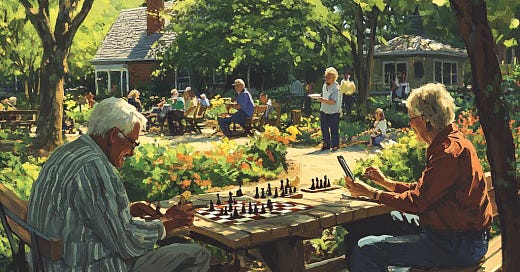Keep Your Brain Young with Hobbies You Love
Because Brain Health Should Feel More Like Play Than Work
Have you ever walked into a room and completely forgotten why? Or spend five minutes trying to remember the name of that actor from that movie? (You know the one!)
You’re not alone.
A lot of you reached out after the article we published earlier this week—Mental Health and Aging: Staying Mentally Active—asking for more ideas on how to keep your minds engaged. So here it is: a fresh batch of hobbies that are as good for your brain as they are for your spirit.
Because here’s the truth: just like our bodies, our brains need regular exercise, especially as we age. And the good news? Staying sharp doesn’t mean slogging through flashcards or downloading apps you’ll forget to open. Some of the best brain workouts come wrapped in joy, creativity, and even a little dirt under your fingernails.
As we age, our brains need just as much exercise as our bodies. The good news?
Keeping your mind sharp doesn’t have to mean endless crossword puzzles or brain-training apps. Some of the best ways to boost cognitive function are through fun, engaging hobbies!
So, whether you’re a senior looking to keep your memory strong or a caregiver hoping to help a loved one stay mentally agile, here’s a list of enjoyable hobbies that give your brain a workout while bringing joy to your daily routine.
Learning a New Language
Picking up a new language isn’t just for globetrotters; it’s an excellent way to challenge your brain. Studies show that bilingual individuals have better problem-solving skills and a lower risk of dementia.
How it helps:
Strengthens memory and attention span.
Enhances multitasking abilities.
Increases mental flexibility and creativity.
Getting started:
Apps like Duolingo or Rosetta Stone make it easy to practice daily.
Join a language club or find a language buddy to practice conversations.
Watch foreign films with subtitles for immersive learning.
Playing a Musical Instrument – The Soundtrack to a Healthy Brain
If you've ever wanted to tickle the ivories or strum a few chords, now’s the perfect time! Playing a musical instrument is one of the most effective ways to engage multiple areas of the brain at once.
How It Helps:
Improves hand-eye coordination.
Enhances auditory processing and memory recall.
Boosts mood and reduces stress.
Getting Started:
Start with something simple like a ukulele or keyboard.
Take online lessons or join a local music group.
Even just listening to music and tapping along has cognitive benefits!
Gardening – Digging Up Brain Power
Believe it or not, tending to a garden is a great way to engage both your mind and body. Plus, nothing beats the satisfaction of growing your own tomatoes!
How It Helps:
Encourages problem-solving and planning.
Reduces stress and promotes mindfulness.
Enhances sensory awareness and fine motor skills.
Getting Started:
Start with a small herb garden if you don’t have outdoor space.
Join a community garden to meet fellow green thumbs.
Experiment with new plants each season to keep things interesting.
Jigsaw Puzzles – Piecing Together Mental Agility
There’s a reason puzzles have been a favorite pastime for generations! They require concentration, pattern recognition, and strategic thinking, which are key elements for a sharp mind.
How It Helps:
Improves short-term memory and visual-spatial skills.
Enhances problem-solving abilities.
Provides a relaxing and rewarding challenge.
Getting Started:
Start with a 500-piece puzzle and work your way up.
Try 3D puzzles or brain-teasing logic puzzles for an extra challenge.
Set up a puzzle table so you can work on it a little each day.
Writing Your Brain on Paper
Whether it’s journaling, storytelling, or writing letters, putting pen to paper can keep your mind sharp while capturing your thoughts and memories.
How It Helps:
Strengthens vocabulary and language skills.
Encourages reflection and emotional processing.
Improves focus and organizational thinking.
Getting Started:
Keep a daily journal to jot down memories or reflections.
Try creative writing short stories, poetry, or even a memoir!
Join a writing group or take an online course.
Playing Chess or Strategy Games
If you love a good challenge, strategy games like chess, checkers, and even card games like bridge can give your brain a real workout.
How It Helps:
Enhances strategic thinking and foresight.
Strengthens problem-solving skills.
Keeps neural connections active and engaged.
Getting Started:
Play online against others or challenge a computer.
Join a local chess club or invite friends over for game nights.
Try other strategy games like Sudoku, mahjong, or Scrabble.
Dancing Steps Up for Brain Health
From ballroom to line dancing, moving to music is one of the best ways to keep both your mind and body active.
How It Helps:
Enhances coordination and balance, reducing fall risks.
Stimulates memory through learning choreography.
Releases endorphins, reducing stress and boosting mood.
Getting Started:
Take a dance class at a local community center.
Try online dance tutorials at home.
Join a dance-based fitness class like Zumba or tai chi.
Cooking – A Recipe for Cognitive Strength
Cooking is more than just a daily necessity; it’s an excellent way to keep your mind active and engaged.
How It Helps:
Encourages creativity and problem-solving.
Engages multiple senses, strengthening memory.
Provides an opportunity for lifelong learning.
Getting Started:
Try a new recipe each week.
Experiment with different cuisines and cooking techniques.
Involve friends or family to make it a fun, social experience.
Stay Curious, Stay Sharp
The key to maintaining cognitive function isn’t just about mental exercises—it’s about staying engaged, curious, and active.
Whether you love music, puzzles, gardening, or dancing, the most important thing is to have fun while keeping your brain active.
So, what’s your favorite brain-boosting hobby? Have you tried any of these, or do you have a new one to share?
Let’s keep the conversation going. Drop a comment below and inspire others to keep their minds sharp!




